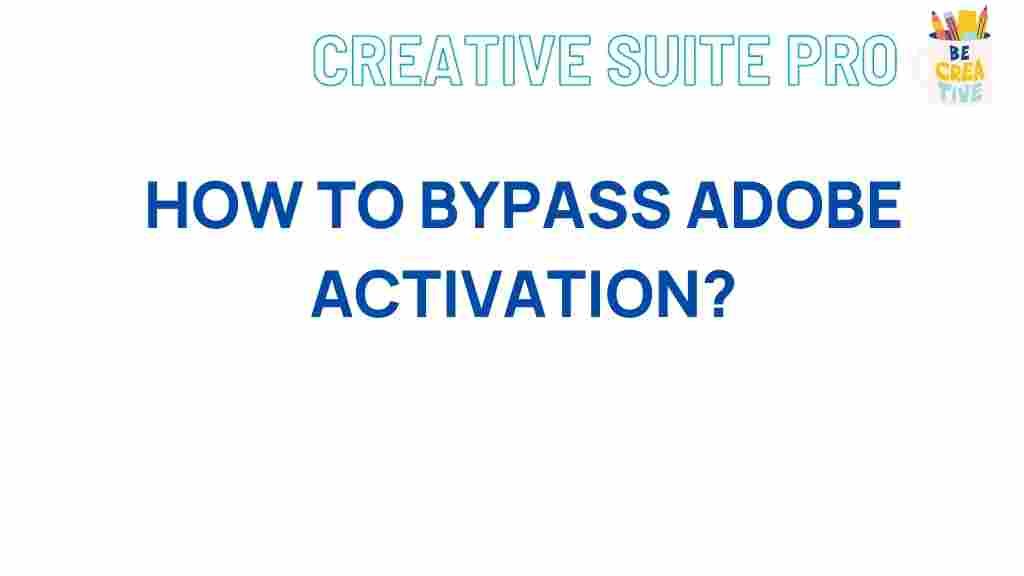Adobe: Unleashing the Secrets of Adobe Activation Bypass Techniques
Adobe products are widely recognized for their powerful features and capabilities, making them a staple for professionals and enthusiasts alike. However, users often face challenges with activation and licensing, leading many to seek Adobe activation bypass techniques. This article explores these techniques, helping you understand the potential methods and considerations involved.
Understanding Adobe Activation
Adobe employs a strict activation process for its software to prevent unauthorized use. This process typically involves entering a serial number or logging into an Adobe account. The activation process verifies the software’s legitimacy, which ensures that users have access to updates, support, and the full range of features. However, this system can be cumbersome for those who face issues with activation or who prefer to use the software without limitations.
Why Bypass Adobe Activation?
While bypassing activation may seem appealing, it is essential to understand the implications:
- Cost Savings: Some users look for ways to save money on software licensing fees.
- Access to Features: Certain features may be locked behind activation walls.
- Convenience: Bypassing activation can provide immediate access to the software.
Despite these reasons, it’s crucial to note that bypassing activation may violate Adobe’s terms of service and could lead to legal consequences.
Step-by-Step Adobe Activation Bypass Techniques
Here are some commonly discussed techniques to bypass Adobe activation. Please approach these methods with caution and be aware of the legal implications.
1. Using a Patch Tool
One popular method involves using patch tools specifically designed to alter the activation process.
- Find a Trusted Patch Tool: Look for reputable forums or websites where users discuss tools that have been tested and verified.
- Download and Install the Tool: Ensure your antivirus is active, as some patches can contain malware.
- Apply the Patch: Follow the instructions provided with the patch tool to modify the Adobe software.
**Note:** Using patch tools can lead to instability in the software and may pose security risks.
2. Modifying Hosts File
Another technique involves editing the hosts file on your computer to block Adobe’s activation servers.
- Navigate to the Hosts File: The hosts file can typically be found in the system32 folder on Windows.
- Add Adobe Servers: Insert entries to block Adobe’s servers. For example:
127.0.0.1 activate.adobe.com127.0.0.1 ereg.adobe.com- Save Changes: Ensure you save the hosts file as an administrator.
Modifying the hosts file can prevent the software from verifying its activation status, allowing you to use it without limitations.
3. Using a Key Generator
Key generators (keygens) are another controversial method for bypassing Adobe activation.
- Search for a Keygen: Like patch tools, be cautious about where you download keygens.
- Run the Keygen: Open the keygen and select the Adobe product for which you need a serial number.
- Copy the Key: Use the generated key to activate your Adobe software.
While keygens can provide quick access, they often come with significant risks, including malware and legal issues.
Troubleshooting Adobe Activation Issues
If you encounter problems during activation or while using bypass techniques, consider the following troubleshooting tips:
1. Common Error Messages
- Error Code 0: Indicates that your activation request was not completed. Check your internet connection or firewall settings.
- Error Code 214: This typically signifies an invalid serial number. Double-check the number entered.
2. Reverting Changes
If a bypass method causes issues with your software, revert the changes made:
- Remove Patch: If you used a patch tool, uninstall it and reinstall Adobe software.
- Restore Hosts File: Revert the hosts file to its original state to restore normal activation processes.
3. Contact Adobe Support
If you’re unable to resolve the issues, consider reaching out to Adobe Support for assistance. They can provide guidance on legitimate activation methods and troubleshooting tips.
Legal Considerations
Before attempting any bypass techniques, it’s essential to understand the legal implications:
- Copyright Infringement: Using bypass methods can violate copyright laws and Adobe’s terms of service.
- Potential Fines: Engaging in software piracy can result in legal action, including fines.
Instead of seeking bypass methods, consider legitimate alternatives such as:
- Adobe’s Subscription Services: Adobe offers a range of subscription plans that may fit your budget.
- Free Trials: Take advantage of Adobe’s free trials to use the software without commitment.
- Discounted Educational Versions: Students may qualify for discounted versions of Adobe products.
Conclusion
While the allure of Adobe activation bypass techniques may be strong, the risks and legal implications make it a precarious choice. Understanding the activation process and exploring legitimate alternatives can lead to a better experience with Adobe software. Always prioritize legal methods to ensure that you have full access to updates and support.
For more information about Adobe products and services, you can visit their official website at Adobe.
This article is in the category Guides & Tutorials and created by CreativeSuitePro Team
